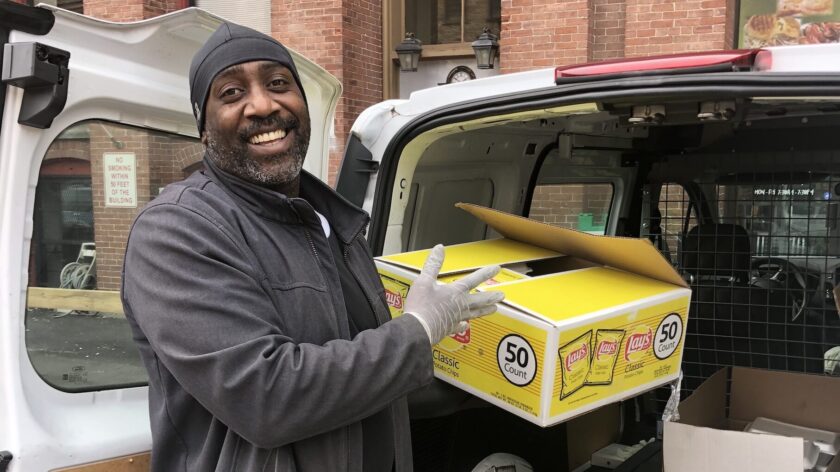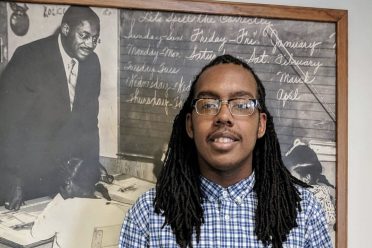
Angel Fana of Coco’s Cafe and Catering in Lawrence, Mass., is part of the Groundwork Lawrence network of community partners.
When crisis hits, community partnerships protect Lawrence’s families, small businesses
BOSTON — Another disaster? Lawrence, Mass., is ready to handle it – through partnerships.
In 2018, natural gas explosions literally rocked the city, set dozens of houses on fire, and forced thousands of people out of their homes. It was a hard blow for a city where the median income hovers around $43,000 and the 2019 poverty rate was 23.7 percent. But after the explosions, a web of nonprofit organizations worked together to help meet individual needs and stabilize the city.
In March, when COVID-19 rocked the whole world, those same nonprofits jumped into action.
“Only three communities were impacted by the gas crisis,” Lawrence Mayor Daniel Rivera recalls. “So we could, for example, say to Boston, Hey, since you’re not being affected by the gas crisis, can you help us? But in this global pandemic, everyone is being impacted, so everyone in Lawrence is standing up to it.”
“That’s why having capacity in the nonprofit sector is huge, because there are philanthropic organizations and businesses that want to do good, so you need a strong nonprofit sector that can facilitate that.”
Among the facilitators is local nonprofit Groundwork Lawrence.
“I think what’s not known about Lawrence is how strong the community is. We have a commitment to partnerships,” Heather McMann, Groundwork Lawrence’s executive director, says.
When the pandemic first hit, McMann thought it would mean closing down for a few weeks. Then, what seemed like an annoyance ballooned into a catastrophe. And Groundwork Lawrence, which improves the environment through community-based partnerships, once again joined fellow nonprofits to help.
Among the crises this time: pandemic-inflamed hunger.
Groundwork Lawrence has long focused on food. The organization supports community gardens, farmers markets, and community sustained agriculture. Its Green Team youth staff works on Groundwork’s urban farm.
Meeting the challenge of COVID-19 forced a pivot. Using grants from several sources, Groundwork Lawrence built community partnerships to feed people.
“In the third or fourth week of the shutdown, we launched a restaurant program. We partnered with Mass Development’s Transformative Development Initiative,” a program for the state’s emerging Gateway Cities that accelerates economic growth in key districts.
Mass Development provided $65,000 and together they sought out restaurant partners who were willing to cook meals for families. Eight restaurants that had shut down because of the pandemic responded, and they received small grants to open – creating a grab-and-go meal program. It now distributes 1,600 meals a week in partnership with the Boys and Girls Club and the Lawrence YMCA. Funding from the McGovern Foundation has kept the program going.
This base of weekly business enabled the restaurants to also start doing takeout. “The restaurants were able to open back up and bring back a third of their workforce,” McMann says. “That small business piece is so important because these businesses are minority-owned, mostly immigrant-owned.”
Another COVID-19 was challenge was keeping families connected to local farmers markets.
Groundwork Lawrence was already running four farmers markets: two in Lawrence, one in Methuen, and one winter market. And since 2017, Massachusetts has had HIP, the Healthy Incentives Program, which enables families who receive federal SNAP benefits to receive more money to buy fruits and vegetables from authorized farms and vendors. A single person can spend up to an additional $40 per month. A family of four can spend up to $60. The program was a success. More families received access to more healthy food. And the annual revenue generated for local farmers grew from $83,000 in 2016 to $600,000 right up until COVID-19.
The new challenge: keep HIP and the farmers markets going in the era of shutdowns, social distancing, and public health safety requirements.
The solution: a virtual alternative.
“What we launched was a virtual box program,” McMann says. Working with two farmers, Groundwork Lawrence created a program that lets families choose what they want, a $40 box of produce or a $60 box. Groundwork Lawrence places the order. The farmers fill them. And families pick up their boxes on Thursdays.
“The part that the McGovern Foundation is helping us fund is changing our farmers market so that it meets the new requirements from our local Board of Health and the state Department of Public Health. We’re also using the funding to make sure that folks who have just qualified for SNAP because they’ve lost their jobs know all about the HIP program.”
Next crisis?
George Floyd was killed in Minneapolis and local police officers were charged in his murder. The country erupted in protests.
So Groundwork Lawrence posted a Black Lives Matter statement on its website and social media platforms. The statement says, in part:
“As an organization whose work is led and informed by members of our community who are most impacted by structural racism, we stand shoulder to shoulder with those that fight for justice and for the right to live without fear of persecution, violence or death.”
“This is a public health issue and a matter of social and environmental justice,” McMann says of structural racism, “We’re talking about black and brown lives and that is the majority of what this city is. Our people are being affected. So, we needed to make that response.”
For Lawrence, the hard work of protecting its community and dealing with whatever comes will continue. McMann says the city will rely on its assets: its three rivers, historic buildings, great neighborhoods, responsive businesses, and resilient residents.
“Lawrence is both a city of the past,” McMann says, referring to the city’s bustling, early 20th century textile manufacturing days, “and a city of the future. We’re thinking about how to be equitable and how Lawrence fits into the greater region. We want to be inclusive, so everyone has opportunities.”
How?
“Through partnerships, both within the city and in the surrounding community.”


